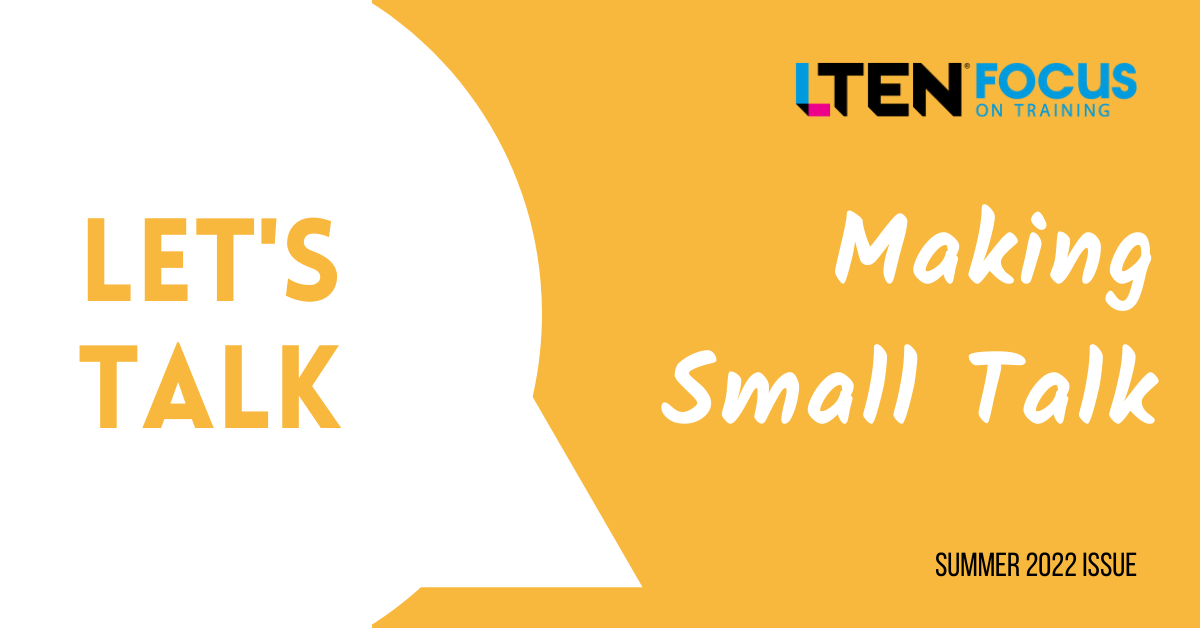
Front of the Room – Brian Lange
As facilitators, we must meet learners ‘where they are’
 Recently, I read with interest – and a dose of sadness, actually – an article in Th e Wall Street Journal. The subject was about how college students must learn “how to make small talk again.” As corporate trainers begin to experience more in-person facilitation opportunities, I believe we can learn from the situation evolving for college students.
Recently, I read with interest – and a dose of sadness, actually – an article in Th e Wall Street Journal. The subject was about how college students must learn “how to make small talk again.” As corporate trainers begin to experience more in-person facilitation opportunities, I believe we can learn from the situation evolving for college students.
A student statement in the article really caught me off guard: “It feels weird to talk to anybody new without first connecting on social media.”
Whoa! This certainly differs from how I’ve gotten to know people throughout my life!
The thing is, my experience is just that: my experience. As a facilitator, I need to meet my learners “where they are” — and that necessitates that I take an even broader perspective when shaping the activities and interactions in my classroom.
It also means that what I likely knew to be true/effective about sparking interaction in my classes pre-pandemic must be re-evaluated post-pandemic (we’re getting there!). I probably should add some new practices to bridge between online learning tactics and the inperson environment for today.
The Sound of Silence
One student referenced in the article shared how once in a Zoom breakout room there was silence for about 6 minutes – and no one had their camera on. The student finally mustered the courage (her word) to ask, “Hey, guys, so what are we supposed to be doing?”
If this is the degree of engagement coming our way when these students hit the workplace, we’re going to have to up our game. Start with ensuring everyone knows what they’re supposed to work on when they go to a breakout room!
Another student acknowledged that the pandemic has made it more difficult to express herself: “If a professor doesn’t encourage participation, I stay quiet.”
Prepare to Engage
This would seem to bring up some key questions for facilitators to ponder:
- What might my learners be feeling as they come back to in-person environments?
- How can I create space for more introverted learners — as well as more extroverted ones (without relying on them too heavily) — while also meeting my need to have a sense of where they are in their learning during my class?
- What are some strategies for “sharing the load” with the class so that I don’t do all the work of exploring the content and generating energy, insights and learning?
Investing some time and thought into answering these questions may help trainers proactively prepare for engaging with their learners. This work may also pay off in helping to shape the openings we conduct — using the insights to select how we want to “position” the workshop and the contributions that learners can make to create the most meaningful learning experience possible.
Mutually Beneficial
Displaying some empathy (while not apologizing) for what people may be feeling coming back to an in-person environment — coupled with articulating what you (the trainer) need from the audience – can be a helpful way to deliver your opening.
I am a fan of telling my learners that I likely won’t call on them directly, but that I need some input throughout the class so that I can try to assess where people are in their learning. This has tended to be a mutually beneficial agreement. As a result, I frequently begin questions during class with, “Let’s hear from someone we haven’t heard from in a while.”
Our work environment is constantly evolving and the move back to in-person will bring some changes. I hope you embrace the opportunities – and I invite you to HMU* on social media before the LTEN Annual Conference in San Antonio this June.
* HMU = hit me up. Popular social media acronym. How’s that for small talk?
Brian Lange is with Perim Consulting and serves as lead facilitator for LTEN PrimeTime! For Trainers Core and Masters Workshops. Email Brian at blange@perim.com.








